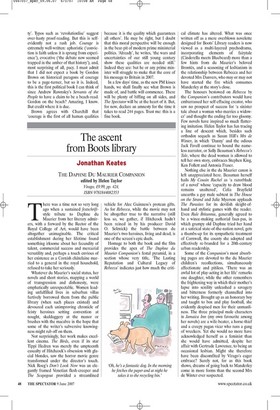The ascent from Boots library
Jonathan Keates THE DAPHNE Du MAURIER COMPANION edited by Helen Taylor Virago, £9.99, pp. 424, ISBN 9781844082353 here was a time not so very long ago when a sustained festschriftstyle tribute to Daphne du Maurier from her literary admirers, with a forward by the Rector of the Royal College of Art, would have been altogether unimaginable. The critical establishment during her lifetime found something irksome about her fecundity of talent, commercial success and mercurial versatility and, perhaps a touch envious of her existence as a Cornish chatelaine married to a general in the royal household, refused to take her seriously.
Whatever du Maurier's social status, her novels and short stories, mapping a world of transgression and dishonesty, were emphatically unrespectable. Women leading unfulfilled lives in suburban villas furtively borrowed them from the public library (when such places existed) and devoured each unimproving chronicle of feisty heroines setting convention at nought, skulduggery at the manor or brushes with the macabre in the hope that some of the writer's subversive knowingness might rub off on them.
Not surprisingly, her work makes excellent cinema. The Birds, even if its star Tippi Hedren was merely the umpteenth casualty of Hitchcock's obsession with glacial blondes, saw the horror movie genre transformed under the director's touch. Nick Roeg's Don't Look Now was an elegantly framed Venetian flesh-creeper and The Scapegoat provided a streamlined vehicle for Alec Guinness's protean gifts. As for Rebecca, while the movie may not be altogether true to the narrative (still less so, we gather, if Hitchcock hadn't been reined in by his producer David 0. Selznick) the battle between du Maurier's two heroines, living and dead, is one of the screen's epic duels.
Homage to both the book and the film provides the apex of The Daphne du Maurier Companion's festal pyramid, in a section whose very title, 'The Lasting Reputation and Cultural Legacy of Rebecca' indicates just how much the critical climate has altered. What was once written off as a mere overblown novelette designed for Boots' Library readers is now viewed as a multi-layered psychodrama, incorporating elements of fairytale (Cinderella meets Bluebeard) more than a few hints from du Maurier's beloved Brontës, and a seasoning of lesbianism in the relationship between Rebecca and her devoted Mrs Danvers, who may or may not have started the fire which consumes Manderley at the story's close.
The honours bestowed on Rebecca by the Companion's contributors would have embarrassed her self-effacing creator, who saw no prospect of success for 'a sinister tale about a woman who marries a widower' and thought the ending far too gloomy. Few novels have inspired so much flattering imitation. Helen Taylor has fun tracing a line of descent which, besides such orthodox sequels as Susan Hill's Mrs de Winter, in which 'Danny' and the odious Jack Faye11 continue to hound the nameless narrator, or Sally Beauman's Rebecca's Tale, where the dead woman is allowed to tell her own story, embraces Stephen King, Ken Follett and Antonia Fraser.
Nothing else in the du Maurier canon is left unappreciated here. Beauman herself hails My Cousin Rachel as 'a razorblade of a novel' whose 'capacity to draw blood remains unaltered', Celia Brayfield unearths a gay male subtext in The House on the Strand and Julie Myerson applauds The Parasites for its devilish sleight-ofhand and stylistic games with the reader. Even Rule Britannia, generally agreed to be a wince-making authorial faux-pas, in which grumpy old Daphne tried her hand at a satirical state-of-the-nation novel, gets a thumbs-up for its sympathetic treatment of Cornwall, the county she adopted and effectively re-branded for a 20th-century urban readership.
Some of the Companion's most absorbing pages are devoted to the du Maurier children's recollections, simultaneously affectionate and pitiless. 'There was an awful lot of play-acting in her life' remarks one daughter, while the other remembers the frightening way in which their mother's lapse into senility unleashed a savagery and bitterness formerly channelled into her writing. Brought up as an honorary boy and taught to box and play football, she evidently despised men for their unmanliness. The three principal male characters in Jamaica Inn (my own favourite among her novels) are a wife-beater, a horse-thief and a creepy pagan vicar who runs a gang of wreckers. Yet she would no more have acknowledged herself as a feminist than she would have admitted, despite her affair with Gertrude Lawrence, to being an occasional lesbian. Might she therefore have been discomfited by Virago's eager embrace? Surely not, for as this book shows, dreams of going back to Manderley come in more forms than the second Mrs de Winter ever suspected.




























































 Previous page
Previous page